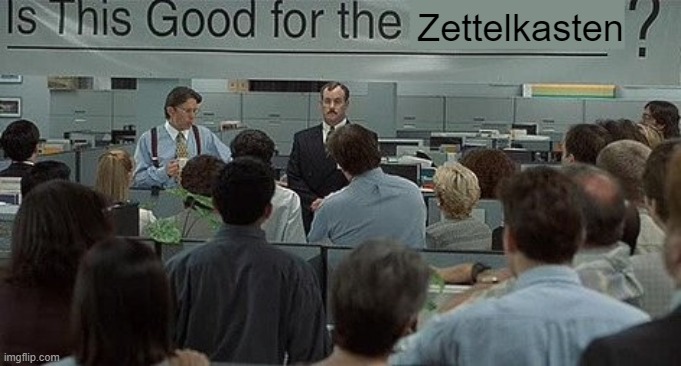reply to m_t_rv_s__n/ at https://www.reddit.com/r/Zettelkasten/comments/164n6qg/is_this_overkill/
First, your system is historically far more traditional than Luhmann's more specific practice. See: https://boffosocko.com/2022/10/22/the-two-definitions-of-zettelkasten/
If you're taking all the notes/highlights from a particular book and keeping them in a single file, then it may be far quicker and more productive to do some high level tagging on the entire book/file itself and then relying on and using basic text search to find particular passages you might use at a later date.
Spending time reviewing over all of your notes and tagging/indexing them individually may be beneficial for some basic review work. But this should be balanced out with your long term needs. If your area is "sociology", for example, and you tag every single idea related to the topic of sociology with #sociology, then it will cease to have any value you to you when you search for it and find thousands of disconnected notes you will need to sift through. Compare this with Luhmann's ZK which only had a few index entries under "sociology". A better long term productive practice, and one which Luhmann used, is indexing one or two key words when he started in a new area and then "tagging" each new idea in that branch or train of though with links to other neighboring ideas. If you forget a particular note, you can search your index for a keyword and know you'll find that idea you need somewhere nearby. Scanning through the neighborhood of notes you find will provide a useful reminder of what you'd been working on and allow you to continue your work in that space or link new things as appropriate.
If it helps to reframe the long term scaling problem of over-tagging, think of a link from one idea to another as the most specific tag you can put on an idea. To put this important idea into context, if you do a Google search for "tagging" you'll find 240,000,000 results! If you do a search for the entirety of the first sentence in this paragraph, you'll likely only find one very good and very specific result, and the things which are linked to it are going to have tremendous specific value to you by comparison.
Perhaps the better portions of your time while reviewing notes would be taking the 150 highlights and finding the three to five most important, useful, and (importantly) reusable ones to write out in your own words and begin expanding upon and linking? These are the excerpts you'll want to spend more time on and tag/index for future use rather than the other hundreds. Over time, you may eventually realize that the hundreds are far less useful than the handful (in management spaces this philosophy is known as the Pareto principle), so spending a lot of make work time on them is less beneficial for whatever end goals you may have. (The make work portions are often the number one reason I see people abandoning these practices because they feel overwhelmed working on raw administrivia instead of building something useful and interesting to themselves.) Naturally though, you'll still have those hundreds sitting around in a file if you need to search, review, or use them. You won't have lost them by not working on them, but more importantly you'll have gained loads of extra time to work on the more important pieces. You should notice that the time you save and the value you create will compound over time.
And as ever, play around with these to see if they work for you and your specific needs. Some may be good and others bad—it will depend on your needs and your goals. Practice, experiment, have fun.

